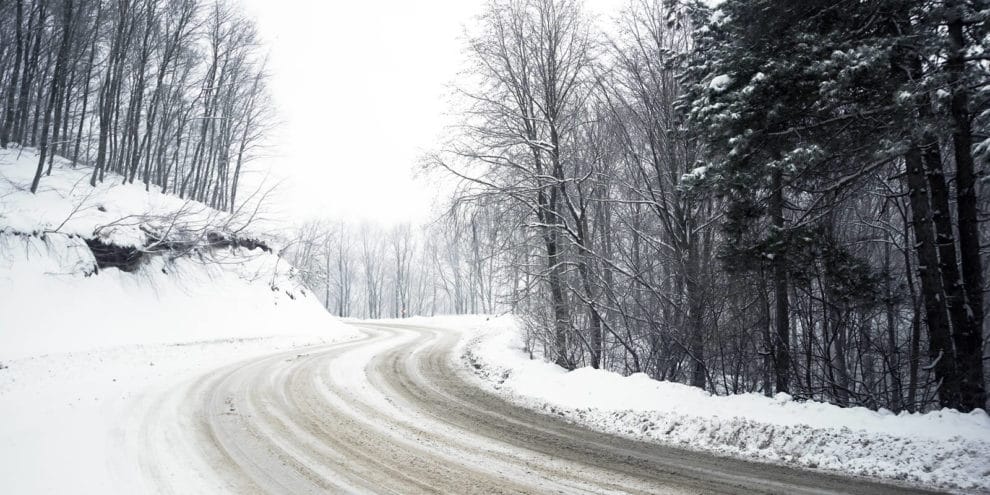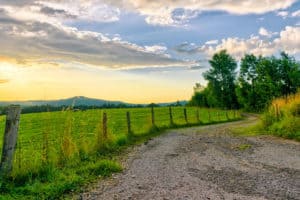I have nothing but respect and affection for state crews who maintain public roads, summer and winter. I don’t feel the same toward certain road-department policies. Here are two examples.
Some years ago, I owned 400 acres of land on both sides of a state-maintained road in another state. The one-and-a-half-lane, paved road was at the top of a mountain and faced north. It was steep, narrow and curvy. It had been bench cut into the north-facing bank, which shielded it from winter sun. As a result, snow piled up and up, and melted slowly. I’ve seen snow there in May.
A week or so after I bought it, the county superintendent of the state road department appeared unannounced in my front yard and offered me a roll of fence wire. I had no idea what he was talking about. It turned out that his crews routinely pushed the accumulated snow over the bank and into what was now “my fence.” As a result, the fence was damaged beyond repair. They had no other place to put the snow. The roll of wire might have been worth $100. The damaged fence line was about 800 feet, maybe a $1,500 job to take down and build anew.
I wanted to build a new fence so that I could pasture cattle behind it. I needed to know the width of the state’s easement, and I wanted to make some arrangement to let the road department remove snow without damaging a new fence.
The road department would not tell me the width of its easement. Nothing was recorded.
I was willing to sell the state a strip of land between my new fence and their easement that would give them space to pile snow. I was willing to have them condemn a strip by eminent domain and accept fair market value, the amount of which was, maybe, $1500. I was willing to install gates in the new fence so that they could dump on my land without pushing over the new fence. I was willing for them to repair damages at their expense each spring. I was willing to consider any solution that would work for both parties.
Having acknowledged state responsibility for damaging the old fence each winter, the county superintendent refused to do anything different. He said to me, “We can do whatever we want with all of your land.” He said to me that I should “give the state the strip of land.”
I was outraged at this taking—and this attitude.
I went to court. I wanted the state to stop damaging my property. I wanted to build a fence on my property. I wanted to know the width of the easement claimed by the state.
The highway department did not produce a single document showing a right-of-way easement, road design, survey or anything else. Nothing. They refused to tell the judge the width of their claimed easement.
First, they claimed they owned an easement of whatever dimension they wanted by adverse prescription or adverse possession. They backed off this argument when I asked whether stealing was official state policy. Then they claimed that the previous owner more than 60 years ago had given them permission to “use whatever land they needed for the new road.” Fine, I said, permission is a license, which ends when the property is sold or the death of the person who granted it in the first place. Permission does not run with the land. Permission means that they cannot obtain the easement by adverse prescription or possession.
Their final argument was that the state had a right to do whatever it wanted in the public interest, including taking my entire 400 acres, and had no responsibility to compensate a private landowner for any damage they caused in keeping roadways open for the public. I could not stop the state from damaging my property year after year, nor could I get them to compensate me for the damage.
The judge said in a preliminary hearing that he would not allow me to introduce into evidence the fact that the superintendent had offered me a roll of wire or any of the statements that he had made to me. He refused to acknowledge that the settled law of permission — the state’s claim to the easement in the absence of any other — ended with the sale of the property or the death of the party granting permission. It was clear that I would lose in this judge’s court.
To have a chance at winning, I would have had to appeal to the state supreme court. I figured that the supreme court would see the interests of its state highway department as superior to those of a private out-of-state landowner, just as the local judge saw it. It would have cost me a lot of money to kick the case upstairs on principle for the purpose of losing the principle. So I dropped the suit, and eventually sold the land to a couple who didn’t care about the fence or the principle.
My wife, herself a county attorney, told me at the beginning to not start with them. “You won’t win,” she said. “The facts and the law won’t matter.” A local lawyer who talked to the judge told me that they couldn’t let me win this case owing to the precedent it would set. The precedent being—the state should pay for takings and damage. Imagine!
As you can see, I’m still enraged over this.
A couple of weeks ago, I noticed that the state road folks were spraying their easement to control vegetation and had consistently exceeded their width—by 20 feet in some cases. I don’t object to spraying on their easement, nor do I object to controlling vegetation on their easement. I do object to having them kill trees that are not on their easement, that is, trees that are mine and have value.
Doing something with a state road department on this kind of matter is an expensive, time-eating, frustrating and quixotic exercise. I am less angry about the second incident than the first, because I didn’t invest in fighting it.
I am a bad citizen, but a more pragmatic one.
Any property with state road frontage involves state maintenance. Buyers are vulnerable to surprises, and owners are vulnerable to arbitrary policies that cost too much for a landowner to correct.
This content may not be used or reproduced in any manner whatsoever, in part or in whole, without written permission of LANDTHINK. Use of this content without permission is a violation of federal copyright law. The articles, posts, comments, opinions and information provided by LANDTHINK are for informational and research purposes only and DOES NOT substitute or coincide with the advice of an attorney, accountant, real estate broker or any other licensed real estate professional. LANDTHINK strongly advises visitors and readers to seek their own professional guidance and advice related to buying, investing in or selling real estate.










I totally agree with you. It’s all about back-room politics. I feel the same way you do about the tree killing. I am so disappointed by the way tree crews use a sideways bushhog to chew up the trees on the right-of-way or just kill everything in their path with chemicals, especially trees NOT on their rights-of-way. I’m sure it’s a big money-saver, but not very good from an environmental standpoint.
I have accually found the opposite to be true here in our fair state of Missouri. I have worked closely with several different road departments regarding state and county easments. In fact, Most I work with, will even go beyond road repair and help establish easments to what would otherwise be discribed as landlocked and uninsurable. (Title Insurance)
Then again, I never had reason to try to sue them.
I can say that we have been fortunate with our dealings in Alabama. We recently deeded a ten foot strip approximately 1/2 of a mile to the County. We new that they would use this to pave the road that was now a county dirt road. We told the county that we would take payment if they paid someone else along this Right of Way. They ended up paying us…. But I would have been just as happy with a nice new paved road. In my dealings we don’t always like what the state, county or city is doing, but without their maintained right of ways, property values are much lower.
This is an old post however, I must comment, because no Federal or State law can be written that violates your constitutional rights, or your liberties in the Bill of Rights. Dear Citizen you are protected by the Bill of Rights under the fifth amendment which reads as follows.
“Amendment IV
The right of the people to be secure in their persons, houses, papers, and effects, against unreasonable searches and seizures, shall not be violated, and no warrants shall issue, but upon probable cause, supported by oath or affirmation, and particularly describing the place to be searched, and the persons or things to be seized.”
The Taking of Property for Public Use is called Eminent Domain it is the power of government to take private land for public use. This power is limited by the federal Constitution and by state constitutions — when the government does take private property for public use, it must fairly compensate the owner for the deprivation.
It is covered in the constitution under the Fifth Amendment. The Fifth Amendment creates a number of rights relevant to both criminal and civil legal proceedings. In criminal cases, the Fifth Amendment guarantees the right to a grand jury, forbids “double jeopardy,” and protects against self-incrimination.
It also requires that “due process of law” be part of any proceeding that denies a citizen “life, liberty or property” and requires the government to compensate citizens when it takes private property for public use.
So sorry I tried to edit my first comment however, I found no way of achieving that. Anyhow, add the fifth amendment in place of the fourth amendment. Again my apologies.
Amendment V
No person shall be held to answer for a capital, or otherwise infamous crime, unless on a presentment or indictment of a grand jury, except in cases arising in the land or naval forces, or in the militia, when in actual service in time of war or public danger; nor shall any person be subject for the same offense to be twice put in jeopardy of life or limb; nor shall be compelled in any criminal case to be a witness against himself, nor be deprived of life, liberty, or property, without due process of law; nor shall private property be taken for public use, without just compensation.
I live in NM, and recently WHOA (wild horses of america) sued for release of a band of wild horses that typically use the golf course, people’s private property, and the highway right of way for grazing. I knew it was just a matter of time until a horse got killed, hopefully not injuring a person. Today I saw a dead horse, surrounded by police vehicles. I have no idea if there was injuries to a human. Who is responsible for the damaged vehicle?and where are the bleeding hearts who wanted this “feral” horses to run free?
Hitting a deer has been know to total a vehicle and kill people, I could not imagine hitting a horse. Nevertheless, I suppose it would be the same as with any wild animal whether a deer, elk, bear, skunk, etc. it is all about fait and what your insurance will cover. Now hitting free range cattle like they have above Bodega Bay where the Alfred Hitchcock movie, the birds was filmed at may be a different story.
Unless the law has changed, if you hit free range livestock in an area where this is legal you are responsible for the value of the livestock you destroyed.
What jurisdiction are you in? This sounds like a terrible overreach by your county government.